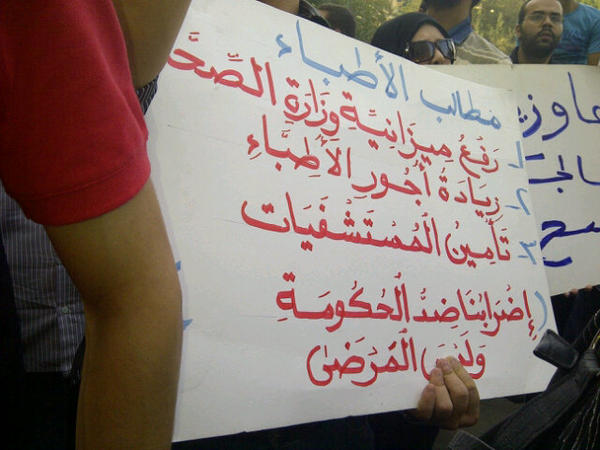CAIRO: Jail time was extended Wednesday for 50 members of the Muslim Brotherhood and two activists. Mohamed El Sharkawy and Karim El Shaer, two activists who have been in the spotlight over the past two weeks for the alleged kidnapping, torture and sexual abuse perpetrated against them, were given another 15 days in prison.
The state security prosecutor has also ordered that a medical exam be given to El Sharkawy, who accused police of torturing and sodomizing him, following a peaceful demonstration at the journalists’ syndicate on May 25.
The May 25 demonstration was in response to the alleged sexual abuse and violence of the May 25, 2005, referendum, which saw female journalists assaulted and activists beaten in downtown Cairo.
El Sharkawy and El Shaer are members of the youth for change movement, which works closely with the umbrella Kefaya (Enough) movement. They are having their jail time extended according to the code of criminal conduct, which allows the prosecution to detain citizens for an unlimited period of time while an investigation is undertaken.
Hamdy Hassan, a Brotherhood MP from Alexandria says that despite the number of arrests, the group will not back down.
“The Brotherhood won’t let up in the face of police force and brutality and the National Democratic party’s use of violence to hold their power is waning, he says.
Another MP, Mustapha Awadallah, also of the Brotherhood, echoes Hassan. “This is all [the government] can do to stop the people, [by] hitting and arresting us.
Since April 24, when security forces picked up a group of pro-reform Kefaya activists, hundreds of activists, Muslim Brotherhood, Kefaya members and others, have been arrested.
Abdel Aziz Saleh, vice-president for the Egyptian Youth party, says that the continued detention will only help galvanize the opposition to maintain their activism.
“These continued detentions only help to give us more strength, he argues. “We have been put down for so long by the government that if they continue to detain our people, it will end with more and more people, and not just activists, on the streets.
Saleh does, however, give a warning to the opposition to be careful when using the detentions as a way of dissent.
“People use the opposition for their own benefit even though most of us are honest and partriotic Egyptians . we have to remember that these are our brethren and we are all Egyptian, he continues. “When the dust finally settles, and it will, members of the NDP are Egyptians like us and they deserve a voice . eventually.
The Muslim Brotherhood, an Islamic-based organization, is officially banned in Egypt, although independents running for parliament under their banner gained approximately 20 percent of seats in last year’s election.
The government has been keen on maintaining strict security over the group and has been rounding members of the banned organization over the last month and a half in large numbers.
On June 1, an attempted demonstration by older activists was thwarted by police, who intervened and arrested three people. They were later released. The demonstration was in response to the alleged torture and sexual assault against El Shaer and El Sharkawi on May 25. Notable intellectuals made an appearance, such as Ahdaf Soueif and Saad Eddin Ibrahim.
Ahmed El Droubi, a leading activist who spent 33 days in prison after being arrested in late April, says that people must know what is going on in the country.
“[The police] have gone further than before and it is important for activists and society as a whole to know what is happening.
According to El Droubi, even when an activist is released, their case remains open indefinitely, which allows for the activist to be arrested again without new charges brought against them.


